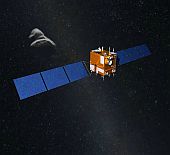 Travelling deep in space, China's space probe Chang'e-2 has successfully conducted a manoeuvre in which it flew by the asteroid Toutatis, about seven million kilometres away from the Earth.
Travelling deep in space, China's space probe Chang'e-2 has successfully conducted a manoeuvre in which it flew by the asteroid Toutatis, about seven million kilometres away from the Earth.
Chang'e-2 had gone past the moon after completing its mission and flew by the asteroid Toutatis on December 13, which the State Administration of Science, Technology and Industry for National Defence (SASTIND) claimed was the first time a space ship flew by the asteroid, named after a Celtic God.
It also made China the fourth country after US, the European Union and Japan to be able to examine an asteroid by spacecraft, state-run Xinhua news agency quoted SASTIND as saying.
Chang'e-2 came as close as 3.2 km from Toutatis and took pictures of the asteroid at a relative velocity of 10.73 km per second, it said.
The Chang'e-2 is continuing its deep space travel and will reach a distance of more than 10 million km away from Earth in January next year.
Chang'e-2 was launched on October 1, 2010 and later orbited the moon to finish a more extensive probe than its predecessor Chang'e-1.
Since its blast-off, Chang'e-2 has captured full coverage map of the moon besides becoming the first object ever to reach the L2 point directly from lunar orbit and being the first to closely observe the asteroid Toutatis.
China early this year published a full coverage map of the moon, as well as several high-resolution images of the celestial body, captured by Chang'e-2.
The resolution of the images is 17 times greater than those taken by Chang'e-1.
"The success of the extended missions also embodies that China now possesses spacecraft capable of interplanetary flight," Wu Weiren, chief designer of China's lunar probe program said.
Chang'e-2's extended missions, which were conducted millions of kilometres away from Earth, have tested China's spacecraft tracking and control network, including two newly built measuring and control stations in the northwest Xinjiang Uygur Autonomous Region and northeast Heilongjiang province, according to SASTIND.
Wu Weiren stressed international cooperation in lunar probes, saying it is a shared responsibility of world scientists to work together in lunar and deep space exploration for the common good of the human race.








 © 2025
© 2025